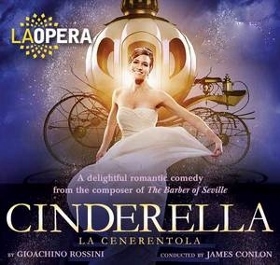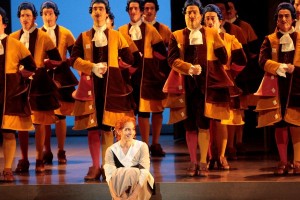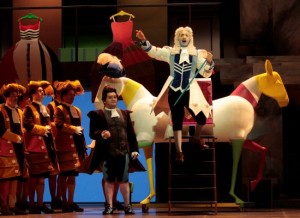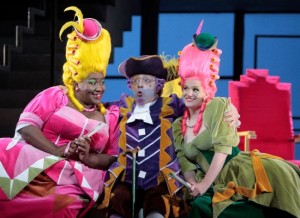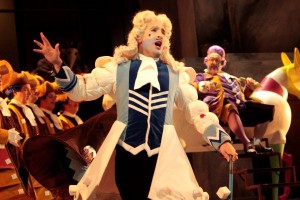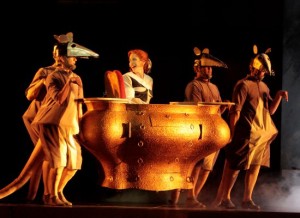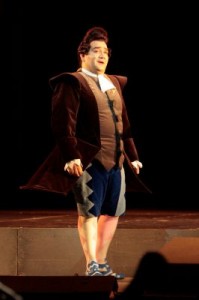EVERYBODY HAS A BALL AT THIS CINDERELLA
Gioachino Rossini’s Cinderella (La Cenerentola) was written in 1817 during the bel canto era when operas were written to showcase beautiful singing, but LA Opera’s delightful production, which opened on Saturday, actually showcased the talents of Spanish Director Joan Font. The spirited and humorous production skittered around a muted Kate Lindsey (as Cinderella) during the first act, but nothing could stop Font’s charming parade of comic touches, which resulted in a rousing and spirited cavalcade of fun. If the first act was a gorgeous and tasty pumpkin, then the second act was a magical coach which transported an enthusiastic crowd to a realm of enchantment.
Forget the ever-popular Disneyfication of Charles Perrault’s 1697 version of this folk tale. Yes, Perrault introduced the Fairy Godmother, magical transformations and glass slippers, but librettist Jacopo Ferretti obviously knew that special effects would be hard to come by in Rome’s Teatro Valle, where the opera premiered. Plus, it was considered brazen to show a woman’s foot in the theater, so Ferretti gave Cinderella a bracelet, which she doesn’t lose but actually hands to her prince.
The Grimm Brothers’ account – with an evil stepmom, pedal mutilation and blinding by a white bird – is also out of the picture. The abuse in the opera begins with Don Magnifico, whose two vain, selfish and motherless daughters, Clorinda and Tisbe, taunt their loving stepsister Angelina (aka Cinderella), whose mother had also passed (I guess women would do anything to get out of a marriage with the unctuous Don).
Then, as is usually the case with comic opera, there are concealed identities (characters were often derived from those of commedia dell’arte): Prince Ramiro’s tutor Alidoro, disguised as a beggar, is investigating potential brides for the Prince. Alidoro is treated kindly by Cinderella, so he alerts the Prince, who later arrives disguised as his valet. Cinderella and the incognito Prince are immediately molto attratti l’uno dall’altro (that means they’re hot for each other).
Meanwhile, the Prince’s valet Dandini, disguised as the Prince, invites everybody back to the palace ball. When the Don is asked about his third daughter, he says she’s dead and all leave without our heroine. Alidoro returns to outfit Cinderella and escort her to the palace’¦ and this is just half-way through the first act. Suffice it to say that more confusion ensues, along with true love, forgiveness and alcohol consumption.
Under James Conlon’s magic wand of a baton, it was Ronnita Nicole Miller and Stacey Tappan (as the sisters) and the two basses and one baritone who ran away with the show, both vocally and with clever presentational farce. My favorite was bass-baritone Vito Priante, who flourished as the valet Dandini; watching him test the boundaries of his newfound princely powers is wholly amusing, but he also mesmerized with “Come un’ape ne’ giorni d’aprile,” perfectly pronouncing the pizzicato-esque fast-paced patter with aplomb.
Bass Nicola Ulivieri beautifully growled out those low notes as Alidoro, but his character development couldn’t surpass that of Italian baritone Alessandro Corbelli as Don Magnifico, who played to the gallery with his breathtaking and grandstanding aria imagining all the pretty ladies who will grease his palm for favors once he’s a part of the royal family. And when the Prince prepares his search for Cinderella, the adorable all-male chorus (under the direction of Grant Gershon) delighted in a number that seemed the likely progenitor to Gilbert & Sullivan.
The luscious and chocolaty-voiced Kate Lindsey was pitch-perfect, but surprisingly lacked power. During the Act One quintet, Ms. Lindsey was practically drowned out, but she certainly holds her own spewing out the tongue-twisting lyrics. When she was accompanied by solo harpsichord, however, there was no doubt why the clear-toned American mezzo-soprano, also a lovely actress, is so in demand (Georgian mezzo-soprano Ketevan Kemoklidze covers the role April 3-13).
American tenor René Barbera was crisply piercing as Prince Ramiro, but I’m looking forward to more shading and resonant power as he matures. Still, the corpulent Mr. Barbera reminded me a bit of an older Spanky from Our Gang and the character-driven choices for his Act Two aria made the number a triumph.
More than just a device for entrancing stage pictures, Mr. Font added six playful rats to the story. The personality-drenched dancers (Laurie Baron Peebler, Richard Bulda, Stephen Hues, Jee Teo, John Todd, Lis Vizcarra) fancifully brought Xevi Dorca’s frisky choreography to life. The audience-pleasing rodents who never sang a note were the big cheeses at the Dorothy Chandler Pavilion, receiving the most sustained applause at curtain call. Joan Guillén’s chimerical rat costumes utilized 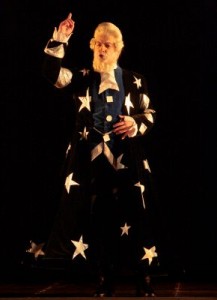 mini-Mickey Mouse ears, long armadillo-like tails that easily whip with a flick, and Spy vs. Spy faces right out of Mad Magazine. So adorable were the rats that we gladly accept their inexplicable appearance at the palace. Guillén’s fairly plain set was a perfect choice as a backdrop to his many whimsical costumes; this was children’s theater on steroids.
mini-Mickey Mouse ears, long armadillo-like tails that easily whip with a flick, and Spy vs. Spy faces right out of Mad Magazine. So adorable were the rats that we gladly accept their inexplicable appearance at the palace. Guillén’s fairly plain set was a perfect choice as a backdrop to his many whimsical costumes; this was children’s theater on steroids.
Above all was the clowning, courtesy of the highly imaginative Mr. Font. Little Vaudevillian touches, such as when the prince is handed a broom and doesn’t know how to operate it, are hilarious. When the Prince hit a rather high note, Mr. Priante did a startled double-take à la Mel Brooks, which my theatergoing companion and I found uproarious. We were shocked when our guffaws were met with a “shhhh” from a nearby audience member. Hey, this ain’t Tosca jumping to her doom off the ramparts of Castel Sant’Angelo, it’s opera buffa. Cinderella is specifically the type of presentation which will attract newcomers to opera – a world seemingly impenetrable to those unfamiliar with the genre.
Cinderella (La Cenerentola)
LA Opera at the Dorothy Chandler Pavilion
co-production of Houston Grand Opera
and Gran Teatre del Liceu (Barcelona)
ends on April 13, 2013
for tickets, call 213.972.8001
or visit LA Opera
